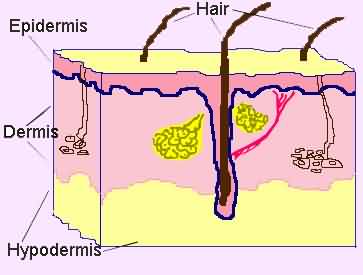What is the structure of your skin?
Skin is made up of three layers.
- The outer layer called epidermis is made up of hard keratin
- The middle layer is the dermis
- It consists of collagen, fibroblast and elastic fibres
- It is rich in nerve endings and blood vessels that gives nourishment to the epidermis
- It contains sebaceous glands (oil glands) and sweat glands. The sebaceous glands produce sebum which is an oily substance
- The bottom layer consists of fat cells which is the subcutaneous tissues

What is the function of your skin?
Skin acts as a protective barrier to:
- Prevent invasion of harmful substances and microorganisms
- Protect the internal organs from injuries
- Regulate body temperature through sweating
What happens to the skin at puberty / adolescence?
There are two main physiological changes that occur:
- Hormones stimulate the oil glands to become active causing
- An increase in sebum production which is more marked in boys
- Unacceptably greasy face, pimples and greasy hair
- Sweat glands (apocrine glands) develop during puberty and are found mainly at the armpits and pubic area
- The sweat from this gland when mixed with bacteria on the skin surface causes body odour
What is healthy and beautiful skin?
Healthy and beautiful skin is the ideal skin which is:
- Smooth, firm and elastic
- Free from blemishes, skin breaks or cracks
Normal skin complexion ranges from being dry to oily.

“Healthy and Beautiful Skin”
What is the normal pH of skin?
Normal skin pH ranges from 4.2 to 5.6.
- It is maintained by sebum production and perspiration (sweating)
- It prevents breaks and cracks in the outer layer of the skin
- It inhibits bacterial growth
How to care for your skin?
Steps for good skin care include:
- Cleaning of the skin
- Regular bath 1 to 2 times daily unless you sweat excessively
- Soap is not harmful but repeated washing can cause dryness as it removes the sebum
- Use of hot water can make the skin dry
- Use mild soap or cleanser if you have dry skin
- For sensitive skin, avoid products that contain perfumes or dyes, as this can cause skin irritation
- Applying moisturizer after bath
- The moisturizer will help to trap the moisture within the skin
- Oil (baby oil) may be used for very dry skin
- For oily skin, you do not need moisturize
- Using facial cleansers and toners only if you have oily skin as they can make skin very dry when the alcohol evaporates
- Using water soluble eye cosmetics around the eyelids as they are less irritating
- Changing of clothes regularly
- Protecting skin from direct sunlight
- Chronic excessive sun exposure causes skin damage. Use sunscreen if necessary
- Sunscreen needs to be reapplied after 2 to 3 hours or after swimming
- Exercise
- Regular exercise improves blood flow to all organs including the skin. This improves skin nutrition and makes the skin healthier
- Nutrition
- Eat a well balanced healthy diet which contains protein, vitamins and minerals
- Vegetable and fruits are rich with vitamins
- Avoiding cigarette smoking
- The free radicals in the smoke can cause premature aging which will bring about wrinkles
- It is also carcinogenic
- Drinking plenty of water to improve skin hydration
| Last Reviewed | : | 28 August 2020 |
| Content Writer | : | Dr. Sorya A. Aziz |
| Reviewer | : | Dr. Nazhatussima bt. Suhaili |







